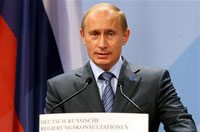Putin decides to brave Iran despite possible assassination threat
Vladimir Putin dispelled all doubts regarding his trip to Iran. "I am definitely going to Iran," Putin stated in Germany after an official meeting with Chancellor Angela Merkel. "If I listened to various threats or recommendations of the security service all the time I would not come out of my home. My colleagues would have to do the same, including Angela Merkel,” Putin said.

The Russian president also stated that he intended to discuss the Iranian nuclear program with the country’s president Mahmoud Ahmadinejad. “There is no perspective in intimidating Iran. One has to use the same diplomatic approach as in the case with North Korea,” Putin added.
Putin told reporters in Germany during a news conference with German Chancellor Angela Merkel that his trip - the first by a Russian president to Iran - would go ahead as scheduled.
Earlier Monday, Putin's spokesman Dmitry Peskov said in Tehran that he could not confirm that Putin would arrive in the Iranian capital late Monday as scheduled.
Russia's Interfax news agency, citing a source in Russia's special services, said Sunday that suicide terrorists had been trained to carry out the assassination in Iran. The Kremlin said Putin was informed about this threat.
Putin said in Germany that the trip to Iran had been planned a long in advance and he would hold talks with Iranian leaders regarding Tehran's disputed nuclear program, although he stressed the original purpose of the trip was to discuss issues affecting states bordering on the Caspian Sea.
Russia, which is building Iran's first nuclear plant, has resisted the U.S. push for stronger sanctions against Tehran and strongly warned Washington against using force. But it has urged Iran to comply with international controls on its nuclear activities and dragged its feet on the plant's completion.
Putin's Tehran trip repeatedly has been postponed, as has the launch of the nuclear plant.
Russia warned early this year that the plant in the southern port of Bushehr wouldn't be launched this fall as planned because Iran was slow in making payments. It has also delayed the shipment of uranium fuel for the plant.
Iranian officials have angrily denied any payment arrears and accused the Kremlin of caving in to Western pressure.
During his visit to Iran, Putin is to meet with President Mahmoud Ahmadinejad and attend Tuesday's summit of Caspian Sea nations. He is the first Kremlin leader to travel to Iran since Josef Stalin attended the 1943 wartime summit with Winston Churchill and Franklin D. Roosevelt.
Iranian Foreign Ministry spokesman Mohammad Ali Hosseini dismissed reports about the assassination plot as disinformation spread by adversaries hoping to spoil Russian-Iranian relations. "Such kinds of false news won't have any impact on the plans that we have for (Putin's) visit," Hosseini told a press conference Monday.
Putin's trip would be important for Iran even ifit yielded noagreements."It's a break in international isolation, a chance to show that Iran is an important country," said Alexander Pikayev, a leading expert on Iran with Russia's Institute for World Economy and International relations.
Iranian media also emphasized the importance of Putin's trip. Iran's state television said the visit would "show Russia's independence from the United States."
"Iran can use the visit to lobby for getting our nuclear dossier out of the U.N. Security Council and Russia can strengthen its opposition to the U.S. through boosting ties with Tehran," the hard-line daily newspaper Resalat said in an editorial Monday.
Last week, Putin bluntly spelled out his disagreements with Washington, saying that he saw no "objective data" to prove Western claims that Iran is seeking nuclear weapons. Though Russia has shielded Iran from harsher sanctions in the U.N. Security Council, its relations with Tehran have been hurt by disputes over the US$1 billion (EUR 0.71 billion) deal to build the nuclear plant.
Iran also has continued its own enrichment program, saying it wants to produce fuel by itself - an effort that has heightened international suspicions. Low-enriched uranium is used to fuel nuclear power plants, but highly enriched uranium can be used to build nuclear weapons.
Iran has insisted that its program is meant purely to generate electricity, and it has stonewalled a Russian proposal to move the enrichment to Russia.
Moscow has said fuel delivery will start six months before the Bushehr plant goes on line, but it keeps delaying the launch date, citing the payment dispute.
"Russia has shown its determination to complete the plant's construction, but it also has underlined the need to solve certain technical issues," Peskov said Monday. The statement appeared to signal that the Kremlin was unlikely to offer any firm commitment regarding the plant's' launch.
Senior diplomats of the Security Council's five permanent members, joined by Germany, are giving Iran until November to show a positive response to questions about its nuclear program or face tougher sanctions. Permanent members Russia and China agreed to two previous sanctions resolutions but so far have cold-shouldered the effort by the U.S., Britain and France to impose harsher measures.
Tuesday's Caspian Sea summit also was unlikely to produce any breakthrough in talks between five nations on dividing the resources of the inland sea, which is believed to contain the world's third-largest energy reserves. The legal status of the Caspian has been in limbo since the 1991 Soviet collapse, leading to tension and conflicting claims to oil deposits.
Iran, which shared the Caspian's resources equally with the Soviet Union, insists that each coastal nation receive an equal portion of the seabed. Russia, Azerbaijan and Kazakhstan want the division based on the length of each nation's shoreline, which would give Iran a smaller share.
Subscribe to Pravda.Ru Telegram channel, Facebook, RSS!


